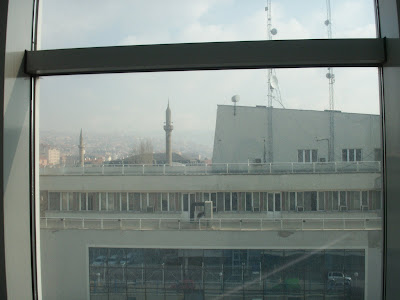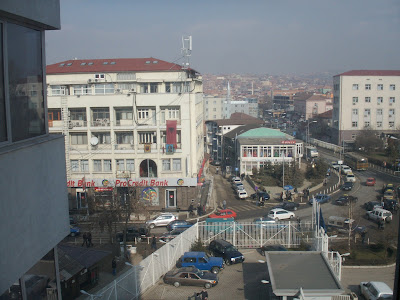The Constitution is based largely on the proposals that were drawn up by the UN’s Special Envoy, Martti Ahtisaari (former President of Finland) in March 2007. It recognises the Republic of Kosovo as an independent, sovereign, democratic, unique and indivisible state, ensures democracy and reflects its multi-ethnic character, with full respect for the rule of law and the highest internationally recognised human rights and fundamental freedoms that guarantee equal rights for all the people of Kosovo. It contains an extensive package of measures to protect minorities, especially the Kosovo Serb community where there are new powers for Kosovo Serb majority municipalities in areas such as healthcare, education. Kosovo will also have the capacity to conclude international agreements and seek membership of international organisations.
I was fortunate to have the opportunity to spend 3 days in Kosova in February, the weekend after Serbia’s presidential elections. This was my first time in Kosova and my first time in the Western Balkans. Flying in over the mountains to the south was an incredible sight. Kosova is an extremely beautiful country and one that certainly has a great deal of potential. Being there in the days before Kosova’s unilateral declaration of independence was an experience in itself. My passport was stamped UNMIK (UN Mission in Kosovo) just to remind me that Kosova was still under UN authority. On the road in from the airport I saw dozens of UN and KFOR vehicles, be they under the flag of the French, the Swedish or the Italian in amongst clapped out tractors. Posters from Kosova’s elections last November were still on the billboards as well as one advertising Hotel Afa which was offering 20% discount for citizens of countries that promised to recognise Kosovo’s independence.



Photos:
The influence of the US is all but subtle especially driving down Boulevard Bill Clinton, and where the English language used in its written form is American English. Coming into Pristina I was struck by the dozens of flats awash with satellites and washing. There was a real buzz about the place with young people everywhere. Kosova has the youngest population in Europe with over half its population under the age of 25. It has a huge diaspora with over 10% of its population living and working in Switzerland and Germany.
Arriving at our hotel we were greeted with independence – it is what everyone was speaking about Right now achieving independence was all that mattered. There seemed to be great optimism about the future with high expectations and an understanding that there is no going back to where Kosovo was in 1999.
There are certainly many challenges facing Kosova, not least the position and treatment of the 120,000 Serbs living in the North and South of the country. Economic investment in Kosova is very low because of the uncertainty over the current political situation and there is much that will need to be done by both the EU and the international community to help the Kosovan government develop its economy, build the necessary infrastructure and encourage foreign business to invest. An international donor conference is planned for June 2008 to discuss priorities and key areas of need.
Likewise, a central tenet in the Kosovan government’s national agenda is the longer term goal of EU membership. Kosova is already part of the EU’s Stabilisation and Association process. A key challenge will be to ensure national laws respect the EU acquis communitaire to fulfil European standards and obligations.
Interestingly, Kosova (like Montenegro) uses the euro as legal tender but this as I discovered is done outwith any agreement with the European Central Bank and depends only on those euros in circulation.
Since Kosova’s declaration of independence on 17 February there has been much mischief making by some commentators that Kosovo could end Scotland’s European dream. International comparisons between the current situation in Kosova and Scotland cannot be made. They are not comparable. The fractured history of the Balkans has resulted in a very different and unique situation in Kosova where its nationalism is based very much on ethnicity in contrast to our civic nationalism.
36 countries have so far recognised Kosovo’s independence, including the UK, France, Germany, Latvia, Ireland, Belgium, Italy, Estonia, Denmark, Luxembourg, the Netherlands, Poland, Austria, Sweden, Finland, Slovenia, Hungary, Bulgaria, Croatia, Switzerland, Iceland, Norway. Lithuania is about to. There is no collective EU recognition of Kosova’s independence as the EU Council agreed it was for each Member State individually to recognise or not an independent Kosova.
In contrast to its failure to act during the 1999 conflict, the EU recognises that the future of the Western Balkans lies within the EU and that Serbia’s integration within the EU is crucial for ensuring the stability of the region. The EU’s role has thus far been limited but that is set to change following the deployment of an 1800 strong civilian law and order mission (EULEX KOSOVO) which is supposed to assist Kosova’s institutions in developing and strengthening an independent, multi-ethnic justice system and multi-ethnic police and customs service, ensuring they are free from political interference and adhering to internationally recognised standards and European best practices. It is early days yet and there no doubt will be difficult challenges ahead in the run-up to May’s elections in Serbia.

No comments:
Post a Comment